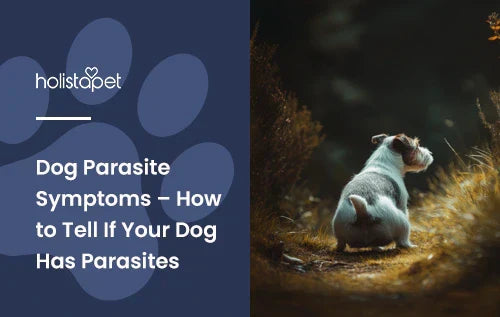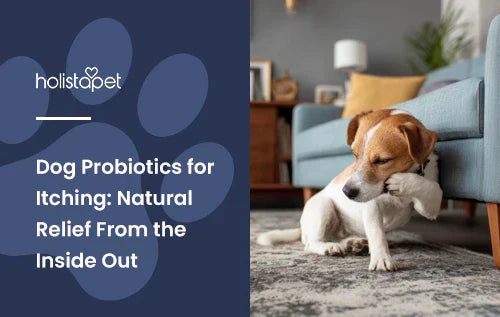Dog parasite symptoms show up in ways pet parents can usually spot quickly. An infected pup might act off, look different, have stool inconsistencies, or show changes in the way they eat.
Catching these issues early helps keep your furry buddy happy, bouncy, and feeling good. So, keep a sharp eye and take quick action always.
Why Recognizing Signs of Parasites in Dogs Matters

Quickly spotting the signs of parasites helps stop bigger health problems down the road. Infected dogs may look normal at first, but tiny changes can warn you of trouble. Parasites can cause issues like discomfort, poor development, and severe illness if ignored. Early recognition and quick attention give our canine friends a stronger chance to bounce back quickly.
What Types of Parasites Can Dogs Have?
Parasites in dogs fall into two main groups: internal parasites and external parasites. Internal ones hide inside the body and affect the digestive system, lungs, or blood. External ones cling to the skin, fur, or ears. Each type brings different risks.
Internal Parasites
Dogs face several internal parasites that target their intestinal tract, blood, or organs. These tiny invaders bring a range of issues that can lead to discomfort or worse if not caught early.
- Roundworms. Often seen in puppies and spread through contaminated soil.
- Hookworms. Attach to the intestinal wall and may cause bloody diarrhea.
- Tapeworms. Passed on through infected fleas and visible as tapeworm segments in the stool.
- Whipworms. Found in the large intestine and can cause whipworm infections.
- Giardia. Single-celled parasites that trigger gastrointestinal upset and queasiness.
- Coccidia. Another dog parasite that can lead to poor growth.
- Heartworms. Spread through mosquito bites and lead to heartworm disease if left untreated.
External Parasites
External parasites live on the skin, fur, or ears. They can cause itching, irritation, and bigger risks if ignored. They spread easily between other canines, small mammals, and even humans in some cases.
- Fleas. Spread tapeworm infections and cause scooting or scratching.
- Ticks. Carry serious risks like Lyme disease.
- Ear Mites. Tiny pests that cause ear scratching and head shaking.
- Mange Mites (Sarcoptes). Lead to rashes and skin irritation.
- Demodex Mites. Trigger breakouts and redness in the skin.
- Lice. Cause itching and poor coat condition in adult canines.
Common Symptoms of Dog Parasites
Parasites in dogs cause a wide range of signs that pet parents can notice without much effort. These symptoms may appear alone or in groups. Watch for the following:
- Digestive Issues
- Weight Loss or Poor Coat Condition
- Excessive Scratching or Skin Irritation
- Visible Worms or Eggs in Stool
- Scooting or Dragging Rear
- Swollen Belly or Distended Abdomen
- Lethargy or Low Energy
- Persistent Coughing
- Anemia or Pale Gums
Digestive Issues
Parasites often target the digestive system first. Infected dogs may show diarrhea, bloating, or even bloody diarrhea in serious cases. Vomiting also appears when the intestinal lining gets irritated. Roundworm, Giardia, or whipworm infections often trigger these digestive signs. Puppies with parasite larvae are at higher risk of intestinal blockage.
Weight Loss or Poor Coat Condition
Parasites steal nutrients from the intestinal tract, leaving pets thin or weak. Even with a strong appetite, an infected dog may show steady weight drop. Puppies face the biggest risks because their bodies need nutrients for growth. A dull coat often appears along with weight changes. Roundworms, hookworms, or tapeworm species all contribute to this issue.
Excessive Scratching or Skin Irritation

External parasites often show up on a dog's skin before anywhere else. Fleas, ticks, or mites cause nonstop itching that leads to redness and raw spots. Some pups may scratch until their skin blemishes or rashes become clear.
Skin irritation also points to infected fleas or mange mites. Ear mites cause scratching around the head and ears, while lice spread itching across the body. Quick parasite control keeps these issues from creating bigger health problems.
Visible Worms or Eggs in Stool
Owners may notice worms or worm eggs in their pet's feces. Tapeworm segments look like small rice grains, while roundworms resemble spaghetti strands. Prior to visually seeing worms in a dog's poo you may notice stool inconsistencies. A microscopic exam can confirm the existence of these parasites.
Dogs with these visible signs need deworming medication right away. Ignoring these red flags increases the chance of intestinal blockage and other serious health issues.
Scooting or Dragging Rear

A dog scooting across the floor may have a parasite infection. Tapeworms often cause itching around the rear because of segments near the anus. This irritation makes dogs drag their backside for relief. Scooting also signals whipworm infections or flea-related irritation. Owners should check their pup's stool and skin for other clues.
Swollen Belly or Distended Abdomen
A swollen belly often signals a parasitic infection, especially in young puppies. Roundworm infection and whipworm eggs can cause bloating by filling the intestinal tract. The dog's body may look puffy even if the rest of the frame seems thin.
A distended abdomen also ties to fluid buildup from heartworm disease or other parasites. Owners who notice this symptom should seek veterinary care immediately. Left untreated, it may lead to intestinal blockage and severe anemia.
Lethargy or Low Energy

Parasites drain the body of strength by feeding on blood or nutrients. Infected dogs often look tired, rest more than usual, and lack their normal playful spark. Puppies may show poor development alongside this constant fatigue.
Hookworm infections and heartworm disease often lead to extreme weakness. A weakened immune system makes recovery slower and opens the door for other infections. Spotting low energy early helps protect a pup's health before bigger problems appear.
Persistent Coughing
Parasites can irritate a dog's lungs and airway, leading to a stubborn cough. Heartworm infection is a common cause, as the worms grow inside blood vessels near the lungs. Infected dogs may hack, gag, or cough after exercise or at night.
Roundworm infection can also trigger coughing when parasite larvae move through the respiratory system. If a cough lingers without a clear cause, contact a veterinarian immediately to rule out canine parasites.
Anemia or Pale Gums
Parasites that feed on blood often cause anemia in dogs. Hookworms drain blood from the intestinal wall, leading to weakness and pale gums. A serious case of anemia may even require a blood transfusion.
Lift your dog's lip and check their gum color as part of regular care. If their gums look light pink or white, parasites may be the reason.
How To Tell If a Dog Has Parasites at Home
Watching a dog's behavior, energy, and bathroom habits gives clear clues. A close look at the skin, stool, and coat can also reveal an infection. If anything looks unusual, contact a qualified veterinarian for help. Early action makes parasite control easier and protects the dog's health.
Behavioral Changes That May Signal Parasites
Restlessness, scooting, or constant licking around the rear can be early signs of parasites. Some canines show unusual fatigue or avoid play because of discomfort. Other dogs may pace, whine, or scratch more than usual. Anxious behaviors and poor sleep also point to possible infection. Spotting these changes early helps owners take quick steps to protect their dog's well-being.
Physical Examination Signs of Parasites in Dogs
Look for redness, rashes, or sores on the dog's skin. Check the ears for dark debris or constant scratching that may suggest mites. Examining their stool often can show worms or segments. A swollen belly or dull coat also raises suspicion. Owners who find these warning signs should contact a vet immediately.
Mail-In Home Parasite Test Kits for Pets
Home parasite test kits let pet owners collect samples, usually stool, and mail them to a lab for analysis. These tests can detect many common parasites such as roundworms, hookworms, and giardia. However, they may not catch all types of parasites, especially those found in the bloodstream or less common strains. While convenient and useful as a first step, they are not as dependable as a full veterinary exam. A vet can run more accurate tests, identify hidden infections, and provide immediate treatment if needed.
When To See a Veterinarian for Possible Parasites
Some parasitic infections need professional care right away. Bloody diarrhea, severe anemia, or noticeable worms in a dog's stool signal urgent problems. A qualified veterinarian can run tests like microscopic examination to confirm the parasite type.
Clinical signs that look mild can still hide serious health risks. Go for early vet visits to prevent lasting health problems and protect other dogs and the people in your home.
Supportive Remedies for Parasite Prevention
Pet parents can help protect their dogs with simple, safe steps at home. Clean living spaces, fresh water, and regular grooming lower the chance of parasitic infection. Flea control also helps stop tapeworm infections, while probiotics may promote a healthy gut and immune system. Let's see how each may help
Regular Grooming and Bathing
Routine brushing and bathing help remove fleas, ticks, and their eggs before they spread. Using natural shampoos with ingredients like oatmeal or neem oil can soothe the skin while reducing the risk of parasite buildup. Clean coats and skin also make it easier to spot early signs of trouble.
Clean Drinking Water and Safe Food
Fresh, filtered water lowers the chance of dogs picking up parasites from contaminated sources. Feeding high-quality food and avoiding raw or spoiled meat helps reduce exposure to harmful organisms. Safe hydration and clean meals form the foundation of parasite prevention.
Flea and Tick Control
Since fleas and ticks carry many parasites, prevention is key. Natural sprays with cedar oil or lemongrass can repel pests without harsh chemicals. Consistent checks after walks or playtime outdoors also keep infestations from spreading.
HolistaPet Probiotic Gut Health Support
![Probiotics For Dogs [Soft Chews] - HolistaPet](https://cdn.shopify.com/s/files/1/0765/3946/1913/files/Probiotic-Infographic-1_472d7a29-e30c-435a-9638-1365d8c3a9f9.jpg?v=1725384841)
HolistaPet Probiotics for Dogs Wellness Soft Chews help keep your pup's tummy balanced and strong. Each heart-shaped chew carries a proprietary blend of 9 beneficial bacteria with 3 billion CFU (colony-forming units). This formula restores harmony in the intestinal tract while promoting smoother digestion and regularity. With pumpkin and sweet potato in every bite, these tasty chews support comfort and well-being from the inside out.
Beyond gut health, these soft chews can also help calm itchy skin and boost overall immunity and quality of life. Each bag has 30 chews, made for dogs of all breeds and sizes. By improving digestive balance and enhancing daily defenses, these chews give pet parents peace of mind.
Maintaining a Clean Living Environment
Vacuuming carpets, washing bedding, and disinfecting play areas help stop eggs and larvae from surviving in the home. A clean space creates fewer opportunities for parasites to cycle back to your dog.
FAQs – Parasites in Dogs
What are the most common parasite symptoms in dogs?
Canine parasite symptoms often include digestive upset, scooting, or noticeable worms in the stool. Some dogs show weight loss, dull coat, or poor growth. Others develop coughing, low energy, or skin irritation. Young puppies face higher risks of swelling, bloating, or bloody diarrhea. Adult pups may also show pale gums from hookworm infections.
How do I know if my dog has worms or another parasite?
Check your dog's stool for visible worms or segments. Watch for scooting, bloating, or weight loss that may point to internal parasites. Dogs with roundworm infection or hookworm eggs often show digestive upset.
A veterinarian can confirm a parasitic infection through microscopic examination. This helps spot whipworm eggs, Giardia infection, or other parasites not visible to the naked eye.
Can parasites in dogs go away on their own?
Parasite infections rarely disappear without care. Internal parasites continue to grow, spread, and cause health issues if left untreated. Roundworm, tapeworm, or whipworm infections all get worse over time.
Only deworming medication and parasite control programs stop the life cycle. A qualified veterinarian can provide the right plan to protect your dog's health.
How can I help prevent parasites in my dog naturally?
Strong immunity and good gut health help dogs resist parasite infections. Adding probiotics, like HolistaPet's, supports the gut and boosts defense.
Also, avoid contaminated soil and mosquito bites. Regular grooming, flea control, and clean water also help reduce risks. Plus, check your dog's stool and skin often, and don't forget routine vet visits.
Final Thoughts on Signs of Parasites In Dogs
Parasites in dogs can bring serious health risks, but spotting symptoms early makes all the difference. Watch for digestive upset, weight loss, scooting, or energy changes.
For added support, HolistaPet offers natural wellness products that aid immunity and gut strength. Our probiotic chews add extra defense against those pesky parasites. With steady care, pet owners can keep their furry companions happy, safe, and thriving 24/7.


 CBD Oil for Dogs - Fast Acting
CBD Oil for Dogs - Fast Acting
 Chicken Flavored CBD Oil For Dogs - Easy Dose
Chicken Flavored CBD Oil For Dogs - Easy Dose
 Salmon Flavored CBD Oil For Dogs - Highly Rated
Salmon Flavored CBD Oil For Dogs - Highly Rated
 CBG Oil for Dogs and Cats - Loved by Thousands
CBG Oil for Dogs and Cats - Loved by Thousands





Leave a comment
All comments are moderated before being published.
This site is protected by hCaptcha and the hCaptcha Privacy Policy and Terms of Service apply.